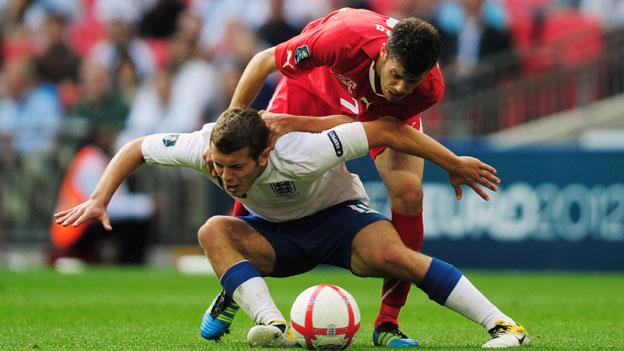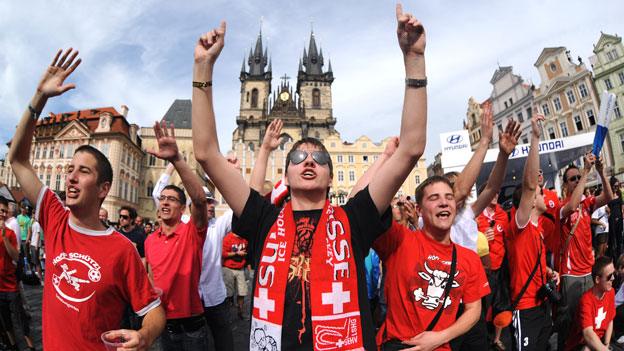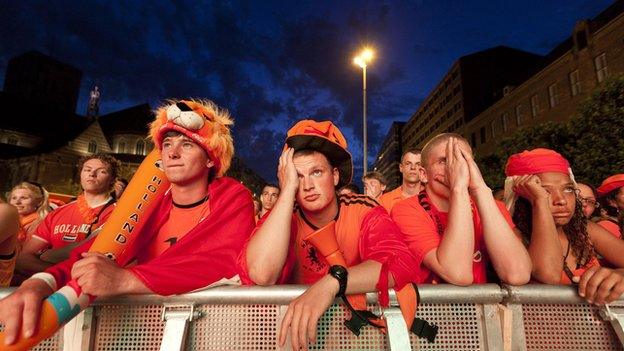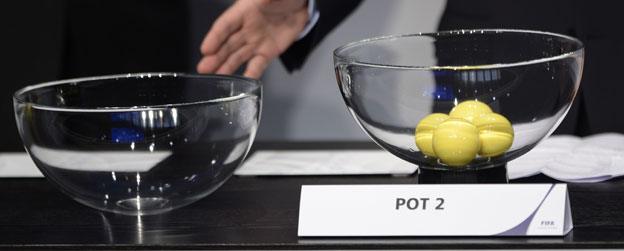World Cup seeding: How to play the game
- Published

The Swiss on top of England - again
Many football fans will be scratching their heads to see Switzerland among the top seeds at next year's World Cup finals, while thoroughbreds like the Netherlands and Italy are not. The truth is that it could be down to the choices made by football administrators, not players.
The eyes of millions of football fans will be focused on Costa do Sauipe in the Brazilian state of Bahia next week, for the 2014 World Cup draw.
A path to glory for the 32 teams that have qualified will be determined when eight pools are created - each containing four teams that will play each other in the group stages.
Eight of the teams are seeds. They are the seven highest-ranked teams in Fifa's world rankings plus the host nation, which is Brazil. Being a seeded team has one big advantage - it means you don't have to play one of the other seeds in the group stages.
The top seven rankings when the seedings were determined in October were Spain, Germany, Argentina, Colombia, Belgium, Uruguay and Switzerland. Brazil, ranked 11th at the time, joined them.
Seeing Spain, Germany, Argentina, Brazil and Uruguay among the seeds shouldn't come as a surprise given their form or footballing history - between them they've won 13 of the 19 World Cups.
How did the Swiss get seeded while the likes of the Netherlands, Italy and England missed out?
Switzerland have had a very good run of results, dominating a weak qualifying group and beating Brazil. But to understand why the Netherlands and the Italians finished just below the Swiss, you need to understand the mysteries of Fifa's ranking system.

It's based on how a team has performed in the last four years, with most of the emphasis on the most recent year. If a country wins or draws a game, it earns points but if a team loses a game, it gets nothing.
Fifa is trying to compare all the national teams and some play many more games than others so to make it fair, the rankings are based on the average number of points earned in each game.
These points are based on who the game is against, whether it is a friendly or a qualifying game and which continent the opposing teams come from, because Fifa gives more points to matches against European and South American teams.
The number of points that can be earned for winning a match can vary hugely.
For example, the Dutch victory over Brazil in the quarter-finals of the last World Cup earned the maximum number of points possible from one match. That is because the Netherlands beat the number one team in the world at the finals of the World Cup.
In Fifa ranking points that's three points for a win multiplied by 200 points for beating the world's best team multiplied by four because it was at the finals, giving a total of 2,400 points.
A more typical example would be a game against an average European team like Finland or the Republic of Ireland. If the Netherlands beat such a team in a World Cup qualifier they get around 1,000 points. If they do it in a friendly, they get 400 points.
But it is possible to get a much smaller number of points for a win. If the Netherlands were to play one of the teams outside the Fifa top 150 in a friendly match, like Indonesia, they would get only a tiny amount of points - just 139.5 for a win.
Of course it makes no sense for the Netherlands to play a game against a team like Indonesia, as whatever happens it will bring down their average number of Fifa points per game. You would have to be completely mad to do something like that in World Cup year, when the points have the most value.
Unfortunately for the orange hordes of Dutch fans, that is exactly what their team did in June 2013. If they hadn't played that game they would be one of the top seeds, not Switzerland, who played fewer friendlies than most teams in the final 12 months that counted towards World Cup qualifying ranking points.

But the Netherlands are not the only team to make this mistake - on 31 May, Italy played a friendly against San Marino, a team that has only won one game in its history. It earned Italy a paltry 150 Fifa points and of course it brought down their average number of points per game, possibly costing them a top seeding.
If you reassess Fifa's October rankings without using the points gained from friendly matches, then Netherlands leap from eighth to fifth and Italy from ninth to seventh, while Switzerland would fall from seventh to ninth and Uruguay from sixth to 10th.
The San Marino and Indonesia games illustrate the way Fifa rankings systems evaluate friendly matches. If you want to be one of the top seeds at the World Cup it is only worth playing teams in the top 20 - although these matches are harder to win.
If England had followed this rule, while others carried on playing friendlies that carried fewer ranking points, Roy Hodgson's team might now be among the top seeds.
In the last 12 months, England have lost to Sweden (ranked 27th), drawn with the Republic of Ireland (67th) and beaten Scotland (33rd), but even the win against Scotland brought their average points total down.
Eduard Ranghiuc, who runs a football rankings website, external, has taken a keen interest in the subject. In April, the Romanian computer programmer wrote to the English FA and advised them to cancel their upcoming friendly games - or try to make these matches "unofficial" by making too many substitutes.
"It was on April 26th, I still have the email. I saw the fixtures they [the English FA] announced against Brazil and the Republic of Ireland and I realised that they were making a mistake with regards to the seeding for the World Cup. I wrote to the FA and I told them that they needed to do something about it. I said treat the friendlies very, very seriously or consider breaching one of the rules… basically making more than six substitutions."
Of course, friendly games can have an important function. They provide commercial benefits to football associations through ticket sales and TV revenue. They also provide a manager with an opportunity to experiment with fringe players and try different formations.

Italy, Netherland and England were seeded in the last World Cup
But football associations spend huge amounts of time and money to give their national teams the best chances of success - the top medical treatment, hotels to stay in, and the best nutrition while travelling in style.
Perhaps in future they will pay someone to crunch the numbers and consider whether the cons actually outweigh the benefits when it comes to playing friendly games.
How important is to be one of the top seeds? In recent years, there has only been one team that has managed to lift the trophy without being a top seed.
That team was Argentina in 1986 and they had Diego Maradona. So England, Italy and the Netherlands shouldn't give up - they just need the best player in the world and the hand of God.
Follow @BBCNewsMagazine, external on Twitter and on Facebook, external